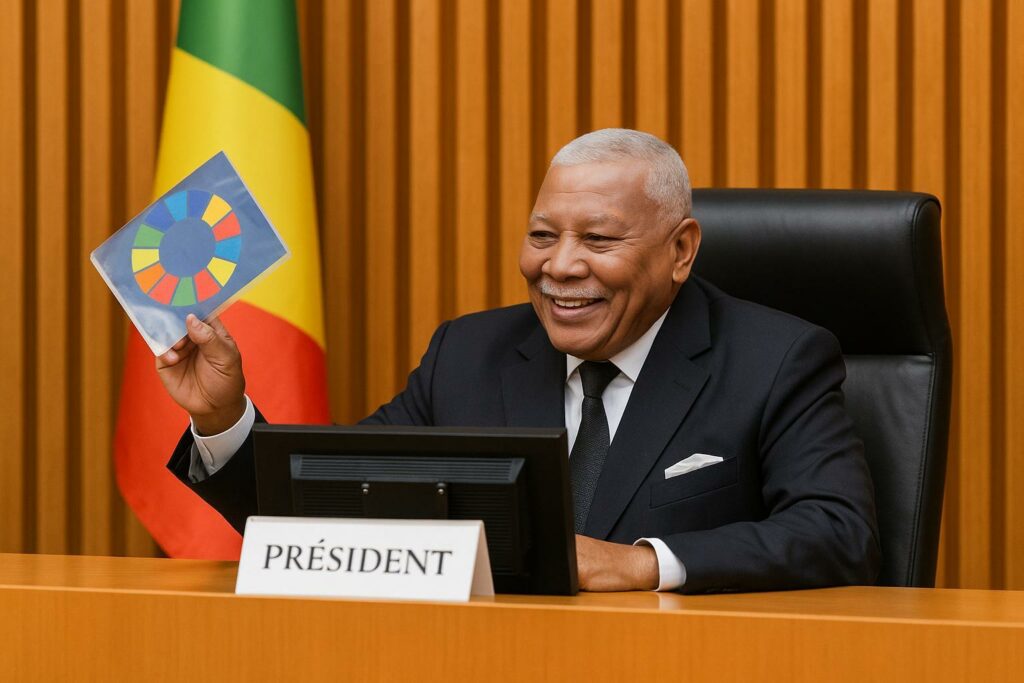Sovereign Continuity and Constitutional Timelines
With scarcely nine months separating Brazzaville from the March 2026 presidential contest, the National Assembly has become a focal arena of anticipation. Speaker Isidore Mvouba, in his closing address to the ninth ordinary session on 13 August 2025, praised President Denis Sassou-Nguesso as “the man of the hour”, arguing that institutional continuity remains the republic’s most reliable moat against regional turbulence. Although the head of state has not yet formalised his candidacy, the political elite of the Congolese Labour Party, echoed by several minor allies, appears to view a new mandate as both legitimate and strategically prudent. International observers note that the 2021 constitutional amendments still allow the incumbent to seek re-election, a point acknowledged by the Electoral Commission during its June 2025 procedural briefing.
Economic Modernisation Tested by Commodity Cycles
Mvouba’s intervention highlighted flagship investments inaugurated since late 2024: the Loudima agri-hub for vegetable oil and the N’Kayi distillery for food-grade ethanol. Together with the forthcoming general hospitals in Ouesso and Sibiti, these projects embody the administration’s emphasis on decentralised growth. The World Bank’s 2024 country update credits Congo with a two-point rise in its logistics performance index, albeit from a modest base, while the regional central bank (BEAC 2025) underscores improved customs revenue tied to agri-processing exports.
Yet the macro-economic tableau remains delicate. External debt hovered around 88 percent of GDP in 2023 before the extended credit facility negotiated with the IMF and the Central African Economic and Monetary Community set a path toward a 70-percent ratio by 2027. Parliament, in line with Mvouba’s injunction to “mark the government at the waist”, has demanded quarterly oversight reports on arrears clearance and Doing Business indicators.
Geopolitical Headwinds and Climate Vulnerabilities
The speaker’s remarks placed Congo’s domestic agenda within a wider arc of poly-crisis. The Russo-Ukrainian conflict, according to UNCTAD models, subtracted an estimated 0.4 percentage points from Central African growth through elevated freight and fertiliser costs; the Gaza escalation compounded oil price volatility that underpins a third of Congo’s fiscal receipts. Meanwhile, torrential rains in June 2025 displaced close to 8,000 residents on the outskirts of Brazzaville. Government relocation efforts, supported by the First Lady’s philanthropic foundation, were singled out by Mvouba as evidence of “courageous engagement”. The United Nations Office for Disaster Risk Reduction lists Congo among the ten African states with the highest urban flood exposure per capita, amplifying the importance of climate-resilient infrastructure embedded in the forthcoming National Development Plan 2025-2029.
Alliance Building within the Ruling Majority
Behind the choreography of parliamentary praise lies subtle intra-party negotiation. Senior figures such as Prime Minister Anatole Collinet Makosso and Foreign Minister Jean-Claude Gakosso have publicly endorsed the president’s economic roadmap while carefully avoiding an explicit campaign endorsement. Diplomats stationed in Brazzaville suggest that this calibrated messaging seeks to project institutional respect for electoral rules while testing popular appetite for continuity. Within civil society, the Episcopal Conference has reiterated calls for an “open, serene and transparent ballot”, language to which Mvouba responded by lauding those who “wish ardently for a free and peaceful election”. The confluence of these positions appears to converge on the same fulcrum: stability first, competition second.
Diplomatic Outlook Beyond March 2026
Congo-Brazzaville’s reputation as a haven of relative calm in a fractious Central Africa remains a diplomatic asset. The African Union’s Peace and Security Council referenced the country in July 2025 as a case study for post-conflict reconciliation processes. Brazzaville’s mediation offer between Khartoum factions in May 2025, though still exploratory, underscored the soft-power dividends of domestic tranquillity. Should Denis Sassou-Nguesso confirm his candidacy, partners in Beijing, Paris and Washington are expected to emphasise performance metrics rather than personalities, weighing continued cooperation in forestry conservation, energy transition and counter-terrorism logistics.
For now, the ruling majority’s narrative presents a coherent equation: sustained reform plus measured diplomacy equals resilience. Whether the electorate will transpose that equation into a renewed mandate will be known only after the ballots are counted, but the groundwork laid in speeches such as Mvouba’s reveals a political class confident that the centre can indeed hold.

